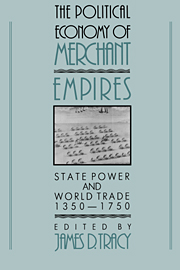Book contents
- Frontmatter
- Contents
- Acknowledgments
- Introduction
- 1 Institutions, Transaction Costs, and the Rise of Merchant Empires
- 2 Merchants and States
- 3 The Rise of Merchant Empires, 1400–1700: A European Counterpoint
- 4 Europe and the Wider World, 1500–1700: The Military Balance
- 5 The Pirate and the Emperor: Power and the Law on the Seas, 1450–1850
- 6 Transport Costs and Long-Range Trade, 1300–1800: Was There a European “Transport Revolution” in the Early Modern Era?
- 7 Transaction Costs: A Note on Merchant Credit and the Organization of Private Trade
- 8 Evolution of Empire: The Portuguese in the Indian Ocean During the Sixteenth Century
- 9 Comparing the Tokagawa Shogunate with Hapsburg Spain: Two Silver-Based Empires in a Global Setting
- 10 Colonies as Mercantile Investments: The Luso-Brazilian Empire, 1500–1808
- 11 Reflections on the Organizing Principle of Premodern Trade
- Selected Bibliography of Secondary Works
- Index
10 - Colonies as Mercantile Investments: The Luso-Brazilian Empire, 1500–1808
Published online by Cambridge University Press: 25 March 2010
- Frontmatter
- Contents
- Acknowledgments
- Introduction
- 1 Institutions, Transaction Costs, and the Rise of Merchant Empires
- 2 Merchants and States
- 3 The Rise of Merchant Empires, 1400–1700: A European Counterpoint
- 4 Europe and the Wider World, 1500–1700: The Military Balance
- 5 The Pirate and the Emperor: Power and the Law on the Seas, 1450–1850
- 6 Transport Costs and Long-Range Trade, 1300–1800: Was There a European “Transport Revolution” in the Early Modern Era?
- 7 Transaction Costs: A Note on Merchant Credit and the Organization of Private Trade
- 8 Evolution of Empire: The Portuguese in the Indian Ocean During the Sixteenth Century
- 9 Comparing the Tokagawa Shogunate with Hapsburg Spain: Two Silver-Based Empires in a Global Setting
- 10 Colonies as Mercantile Investments: The Luso-Brazilian Empire, 1500–1808
- 11 Reflections on the Organizing Principle of Premodern Trade
- Selected Bibliography of Secondary Works
- Index
Summary
THEMATIC FOCUS
Within the context of the historical formation of commercial empires, our emphasis will focus on the Luso-Brazilian Empire. From this, we hope to be able to establish comparative relations with the other colonial empires at precisely those essential points that could give us an understanding of the global process. Obviously, the first chronological point will be the year 1500 – when Portuguese commercial and maritime expansion reached Brazil. The ending date will be 1808: the date the opening of ports broke the Portuguese monopoly on its Brazilian colony. In more restrictive terms, that is, in terms of a colony as a mercantile investment, the beginning date has to be delayed until the 1530's. This was the start of the first commercial agricultural activity in the colony: the sugar mill in Sāo Vicente. If one considers the topic of commercial empires from the perspective of the colonies, a 1750 date has meaning for the struggle for European hegemony, which England had by now wrested from Holland, and which figures largely in the definition of a new pattern of colonialism. But, for the colonial system in a broad sense, 1776 is a much more important date because it marks the rupture of the colonial compact, with the transformation of a former colony into an independent nation. The year 1810, when Spanish colonies rose in revolt during French intervention in Spain, has a similar meaning for Spanish America.
- Type
- Chapter
- Information
- The Political Economy of Merchant EmpiresState Power and World Trade, 1350–1750, pp. 360 - 420Publisher: Cambridge University PressPrint publication year: 1991
- 3
- Cited by



